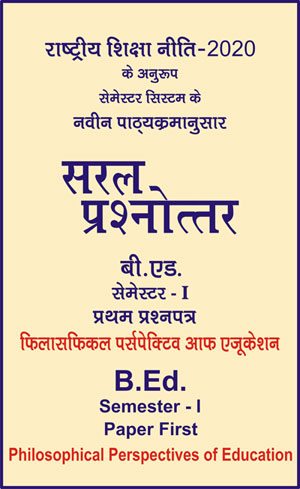|
बी एड - एम एड >> बी.एड. सेमेस्टर-1 प्रश्नपत्र-I - फिलासफिकल पर्सपेक्टिव आफ एजुकेशन बी.एड. सेमेस्टर-1 प्रश्नपत्र-I - फिलासफिकल पर्सपेक्टिव आफ एजुकेशनसरल प्रश्नोत्तर समूह
|
|
|||||||
बी.एड. सेमेस्टर-1 प्रश्नपत्र-I - फिलासफिकल पर्सपेक्टिव आफ एजुकेशन (अंग्रेजी भाषा में)
Question- Describe the main characteristics of Pragmatic Philosophy.
Answer -
Basic Characteristics of Pragmatic Philosophy
According to Bruce Kimball, there are six basic characteristics of pragmatism in "The Condition of American Liberal Education":
- That it is the belief and meaning, even truth itself, fallible and revisable.
- That it is an experimental method of inquiry obtained in all science and reflective thought.
- It is a belief, meaning, and truth dependent on the context and the inter-subjective judgment of the community in which they are formed.
- It stresses upon that experience as the dynamic interaction of organisms and environment, resulting in a close interrelationship between thought and action.
-
That the purpose of resolving doubts or solving problems is intrinsic to all thought and inquiry; and
-
That all inquiry and thought are evaluative, and judgments about fact are no different from judgments about value.
Other Characteristics of Pragmatic Philosophy
Other characteristics of pragmatic philosophy are as follows :
-
It is uniquely a American philosophy, has much to offer as Americans question the value of a liberal education and expect us to prepare students not only for personal development but for leadership in the community and the workplace.
-
It is based on the principle that the usefulness, workability, and practicality of ideas, policies, and proposals are the criteria of their merit.
-
Pragmatists interpreted ideas as instruments and plans of action. In contrast to the conception of ideas as images and copies of impressions or of external objects, pragmatist theories emphasized the functional character of ideas.
-
In methodology, pragmatism was a broad philosophical attitude toward the formation of concepts, hypotheses, and theories and their justification.
|
|||||

 i
i 










